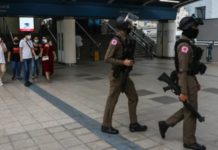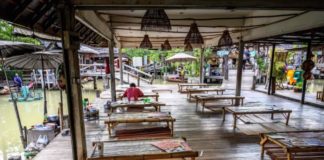
Thailand’s pandemic panic has failed to deter aspiring Chinese entrepreneurs from starting businesses, with some even plowing money into acquiring hotels, property and land amid record-low prices.
Starting up a business is a process to accumulate experience,” said Nancy Chen, who along with her husband rented a hotel on the resort island of Phuket in July.
“We are starting small, and this hotel business will help us explore before stepping our foot into the tourism industry,” said the southern Fujian native, who is in her 30s.
Thailand has a sizable population of about 200,000 Chinese residents, according to industry estimates. They study, retire, work or run businesses, mostly catering to their mainland peers.
In 2019, about 11 million Chinese visited Thailand, more than from any other country.
As the coronavirus continues to rampage across Southeast Asia, the tourism authority in Thailand estimated in June that total foreign arrivals would plunge to 3 million this year, down from its forecast of 4 million in April, when the latest and most severe outbreak began.
While fewer Chinese dollars means making their business stay afloat is a tremendous challenge, some entrepreneurs are not calling it quits just yet.
They say now is the best time to enter the market for bargains and get ready for when Thailand regains its pre-pandemic tourism crown.
“This is a year not to rent or sell your property in Thailand, but one that is great to buy,” said Li Ming, founder of realtor Ming Thai Inter in Bangkok. “Even if you make investments, don’t expect to have immediate returns until at least 2022.”
The 34-year-old, from Jiangxi Province, graduated from a Thai university in 2010. He stayed, married a Thai and set up a company to help Chinese buy and sell property locally.
Li and his wife have bagged a few bargains since late 2020: a 40% discounted landed property in the beach resort city of Pattaya, east of Bangkok; a 4 million baht ($123,200), 35-sq.-meter condo in the capital that fetched over 6 million baht only three years ago.
He has just signed a deal to pocket a 10.5-rai (16,800-sq.-meter) plot of land in the Bangyai district of Nonthaburi Province — half the selling price of adjacent land.
“I plan to develop the land into houses or factory warehouses. But it has to be done in a cautious manner because of the uncertainties amid COVID-19,” he said.
In Thailand’s post-pandemic recovery efforts, the authorities are considering dangling more perks, including a 10-year visa and letting high-net-worth foreign individuals buy land, which has long been prohibited.
These rich people are each expected to invest at least half a million dollars in the country.
Phuket’s Chen said that in pre-pandemic times, taking over the hotel would have cost her a nonrefundable transfer fee of 2 million baht.
“Now we struck a deal by signing a 10-year lease from the owner, paying a deposit of 500,000 baht and a fixed monthly rent of 60,000 baht for the first three years.”
She said 18 rooms out of the 26 have now been rented out on a monthly basis, which covers her rent. She is upbeat that tourists will flock back to Phuket when international borders reopen in the future.
But not all are lucky.
Wendy He, who came to Thailand to teach Chinese in 2013, invested 1.5 million baht with her family to open a 300-sq.-meter Chinese restaurant, Kungfupot, in Chiang Mai’s old town three years later.
The 30-year-old decided to shutter the shop this year after Chiang Mai, a top-three destination for Chinese visitors, had not brought her enough business to cover operational costs.
She still plans to stay on in the northern province and is in no rush to figure out the next step. – NikkeiAsia




































